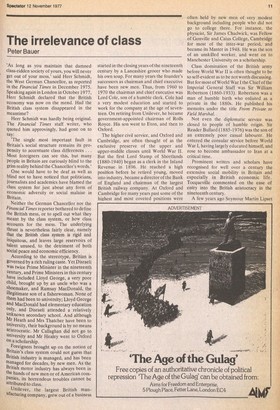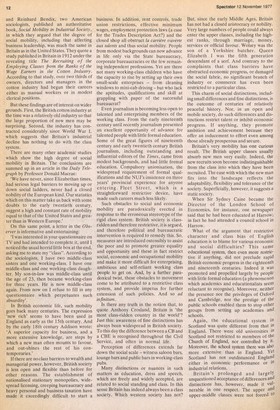The irrelevance of class
Peter Bauer
'As long as you maintain that damned class-ridden society of yours, you will never get out of your mess,' said Herr Schmidt, the West German Chancellor, as reported in the Financial Times in December 1975. Speaking again in London in October 1977, Herr Schmidt declared that the British economy was now on the mend. Had the British class system disappeared in the meantime?
Herr Schmidt was hardly being original. The Financial Times staff writer, who quoted him approvingly, had gone on to say: 'The single most important fault in Britain's social structure remains its propensity to accentuate class differences . . . Most foreigners can see this, but many people in Britain are curiously blind to the grim reality behind the Chancellor's words.'
One would have to be deaf as well as blind not to have noticed that politicians, journalists and academics have blamed the class system for just about any form of economic adversity or social malaise in Britain.
Neither the German Chancellor nor the Financial Times reporter bothered to define the British mess, or to spell out what they meant by the class system, or how class accounts for the mess. The underlying thrust is nevertheless fairly clear, namely that the British class system is rigid and iniquitous, and leaves large reservoirs of talent unused, to the detriment of both social peace and economic efficiency.
According to the stereotype, Britian is governed by a rich ruling caste, Yet Disraeli Was twice Prime Minister in the nineteenth century, and Prime Ministers in this century have included Lloyd George, a very poor Child, brought up by an uncle who was a Shoemaker, and Ramsay MacDonald, the Illegitimate son of a fisherwoman. None of them had been to university; Lloyd George and MacDonald had elementary education Only, and Disraeli attended a relatively unknown secondary school. And although Mr Heath and Mrs Thatcher have been to university, their background is by no means aristrocratic. Mr Callaghan did not go to university and Mr Healey went to Oxford on a scholarship. Foreigners brought up on the notion of Britain's class system could not guess that British industry is managed, and has been managed for decades, by new men. As the British motor industry has always been in the hands of new men or of American companies, its horrendous troubles cannot be attributed to class.
Unilever, the largest British manufacturing company, grew out of a business started in the closing years of the nineteenth century by a Lancashire grocer who made his own soap. For many years the founder's successors as chairman and chief executive have been new men. Thus, from 1960 to 1970 the chairman and chief executive was Lord Cole, son of a humble clerk. Cole had a very modest education and started to work for the company at the age of seventeen. On retiring from Unilever, he became government-appointed chairman of Rolls Royce. His son went to Eton, and then to Oxford.
The higher civil service, and Oxford and Cambridge, are often thought of as the exclusive preserve of the upper and upper-middle classes until World War II. But the first Lord Stamp of Shortlands (1880-1940) began as a clerk in the Inland Revenue in 1896. He reached a high position before he retired young, moved into industry, became a director of the Bank of England and chairman of the largest British railway company. At Oxford and Cambridge for many years past some of the highest and most coveted positions were often held by new men of very modest background including people who did not go to college there. For instance, the physicist, Sir James Chadwick, was Fellow of Gonville and Caius College, Cambridge for most of the inter-war period, and became its Master in 1948. He was the son of an unskilled worker, and went on to Manchester University on a scholarship.
Class domination of the British army before World War H is often thought to be so self-evident as to be not worth discussing. But for most of World War I the Chief of the Imperial General Staff was Sir William Robertson (1860-1933). Robertson was a man of humble birth who enlisted as a private in the 1880s. He published his memoirs under the title From Private to Field Marshal.
Not even the diplomatic service was closed to people of humble origin. Sir Reader Bullard (1885-1976) was the son of an extremely poor casual labourer. He entered the consular service before World War I, having largely educated himself, and rose to become ambassador to Iran at a critical time.
Prominent writers and scholars have recognised for well over a century the extensive social mobility in Britain and especially in British economic life. Tocqueville commented on the ease of entry into the British aristocracy in the nineteenth century.
A few years ago Seymour Martin Lipset and Reinhard Bendix, two American sociologists, published an authoritative book, Social Mobility in Industrial Society, in which they argued that the degree of social mobility, including that affecting business leadership, was much the same in Britain as in the United States. They quote a study published in Britain in 1912 under the revealing title The Recruiting of the Employing Classes from the Ranks of the Wage Earners in the Cotton Industry. According to that study, over two thirds of owners, directors and managers in the cotton industry had begun their careers either as manual workers or in modest clerical positions.
But these findings are of interest on wider grounds. First, the British cotton industry at the time was a relatively old industry so that the large proportion of new men may be surprising. Second, the industry has contracted considerably since World War I, which suggests that Britain's industrial decline has nothing to do with the class system.
There are many other academic studies which show the high degree of social mobility in Britain. The conclusions are summed up in an article in the Daily Telegraph by Professor Donald Macrae: 'We have never, since Elizabethan times, had serious legal barriers to moving up or down social ladders, never had a closed nobility of the European kind. Our statistics which on this matter take us back with some doubts to the early twentieth century, suggest a high and constant rate of mobility equal to that of the United States and greater than in Western Europe.'
On this same point, a letter in the Observer is informative and entertaining: was interested in your questionnaire on TV and had intended to complete it, until I noticed the usual horrid little box at the end, asking me to state my "class". According to the sociologists, I have two middle-class sisters and one working-class. I have one middle-class and one working-class daughter. My son-in-law was middle-class until the age of 23, then became working-class for three years. He is now middle-class again. From now on I refuse to fill in any questionnaire which perpetuates such absurdity'.
In British economic life, such mobility goes back many centuries. The expression 'new rich' seems to have been used in England as early as the 15th century. And by the early 18th century Addison wrote: 'A superior capacity for business, and a more extensive knowledge, are steps by which a new man often mounts to favour, and out-shines the rest of his contemporaries.'
If there are no class barriers to wealth and managerial power, however, British society is less open and flexible than before for other reasons. The establishment of nationalised stationary monopolies, widespread licensing, creeping bureaucracy and heavy personal and business taxation have made it exceedingly difficult to start a business. In addition, rent controls, trade union restrictions, effective minimum wages, employment protection laws (a case for the Trades Description Act?) and the closed shop all obstruct la carriere ouverte aux talents and thus social mobility. People from modest backgrounds can now advance in life only via the State bureaucracy, corporate bureaucracies or the few remaining independent professions. Yet are there not many working-class children who have the capacity to rise by setting up their own small-scale enterprises — from cleaning windows to mini-cab driving — but who lack the aptitudes, qualifications and skill at grappling with paper of the successful bureaucrat?
Even journalism is becoming less open to talented and enterprising members of the working class. From the early nineteenth century until recently journalism presented an excellent opportunity of advance for talented people with little formal education. Some of the great figures of nineteenth century and early twentieth century British journalism, including outstanding and influential editors of the Times, came from modest backgrounds, and had little formal education. Compulsory unionisation, the widespread requirement of formal qualifications and the NUJ's insistence on three years' provincial experience for anyone entering. Fleet Street, which is a straightforward restrictive device, have made such careers much less likely.
Such obstacles to social and economic mobility are paradoxically erected in response to the erroneous stereotype of the rigid class system. British society is classridden and therefore restrictive, it is argued, and therefore political and bureaucratic intervention is required to remedy this. So, measures are introduced ostensibly to assist the poor and to promote greater equality and opportunity and these in fact restrict social, economic and occupational mobility and make it more difficult for enterprising, ambitious and self-reliant working class people to get on. And, by a further paradoxical twist, these obstacles to movement come to be attributed to a restrictive class system, and provide impetus for further extension of such policies. And so ad infinitum.
Is there any truth in the notion that, to quote Anthony Crosland, Britain is 'the most class-ridden country in the world'? Just this: awareness of fine distinctions has always been widespread in British society. To this day the difference between a CB and a CBE is recognised throughout the Civil Service, and often in normal life.
Perception of differences extends far down the social scale — witness saloon bars, lounge bars and public bars in working-class pubs.
Many distinctions or nuances in such matters as education, dress and speech, which are freely and widely accepted, are related to social standing and class. In this sense Britain has indeed always been a class society. Which western society has not? put, since the early Middle Ages, Britain has not had a closed aristocracy or nobility. Very large numbers of people could always enter the upper classes, including the highest ranks, through marriage, money, services or official favour. Wolsey was the son of a Yorkshire butcher. Queen Elizabeth I was the fifth generation descendant of a serf. And contrary to the complaints that class barriers have obstructed economic progress, or damaged the social fabric, no significant branch of industry or commerce has even been restricted to a particular class.
This charm of social distinctions, including small differences and fine distinctions, is the outcome of centuries of relatively peaceful history. Nor, in an open and mobile society, do such differences and dis tinctions restrict talent or inhibit economic progress. If anything, they promote ambition and achievement because they offer an inducement to effort even among those already prosperous and secure.
Britain's very mobility has one curious result. The British upper classes usually absorb new men very easily. Indeed, the new recruits soon become indistinguishable from the class into which they have been recruited. The ease with which the new man fits into the landscape reflects the adaptability, flexibility and tolerance of the society. Superficially, however, it suggests a static society.
When Sir Sydney Caine became the Director of the London School of Economics, for instance, one newspaper said that he had been educated at Harrow; in fact he had attended a council school in Harrow.
What of the argument that restrictive character and class bias of English education is to blame for various economic and social difficulties? This same educational system, then even more restric tive if anything, did not preclude rapid British economic progress in the eighteenth and nineteenth centuries. Indeed it was promoted and propelled largely by people with little formal education (a phenomenon which academics and educationalists seem reluctant to recognise), Moreover, neither the presence nor the privileges of Oxford and Cambridge, nor the prestige of the public schools enabled them to stop other groups from setting up academies and schools.
Again, the educational system in Scotland was quite different from that in England. There were old universities ie Scotland not restricted to members of the Church of England, nor controlled by it.
Moreover, the school system there was also more extensive than in England. Yet Scotland has not outdistanced England either in economic performance or in industrial relations.
Britain's prolonged and largelY unquestioned acceptance of differences and distinctions has, however, made it vulnerable in one respect. The upper and upper-middle classes were not forced to examine or rationalise their position. They were thus ill-placed to face the emergence and upsurge of egalitarian sentiment throughout the Western world. Having taken their situation for granted, their representatives could not analyse or explain it. They knew — and perhaps could even articulate — the distinction in rank between a baron, a baronet, and a knight, or even between a CB and a CBE, but not between a differentiated yet open and mobile society on the one hand, and a restrictive, closed, or caste society on the other hand. Still less were they able to cope with the arguments or sentiments behind egalitarian policies, and the granting of far-reaching privileges to trade unions, or the politicization of social and economic life.
The loss of poise and nerve was accentuated by the emergence of a guilt feeling over the presence of social and income differences, in the face of a growing belief that all such differences are abnor mal and reprehensible. May not the pervasive and subtle influence of the machine on language and thought also have served to discredit social and economic differences? A machine turns out identical products. There is something wrong with a mould or a steel press or a lathe if its products are not identical. The judgment that there is something wrong with social and economic differences may owe something to this criterion of efficiency.
Intellectuals in Britain, as we have seen, are 'much more obsessed with class than their counterparts in other countries in Europe and elsewhere, where class distinctions and barriers are much clearer and firmer. There may be various reasons for this. Because they read and write English, they are apt to compare British society with American society (which, on the surface at any rate, is more open that British society), rather than with other societies.
The long and relatively peaceful continuity of British history and society may have been a more important factor. The virtual absence of violent change has suggested a stable social system and an impregnable and static ruling class. The unobtrusive ease with which new men rose in the social scale and became indistinguishable from their former social superiors reinforces this. The open and mobile character of British society compared to continental society may also have encouraged preoccupation with class. It made the aristocracy and other prosperous groups more conspicuous and thus more envied and resented than elsewhere.
What, finally, is the political effect of these obsessions with a mythical 'classridden Britain'? Clearly the persistent harping ,on differences and distinctions is not designed to bring about equality. As we have seen, it tends to produce a frozen and thoroughly politicised society in which all aspects of life are subjected to political or Corporate direction. Herr Schmidt may be wrong. But the views he holds have contributed to our mess.




































 Previous page
Previous page